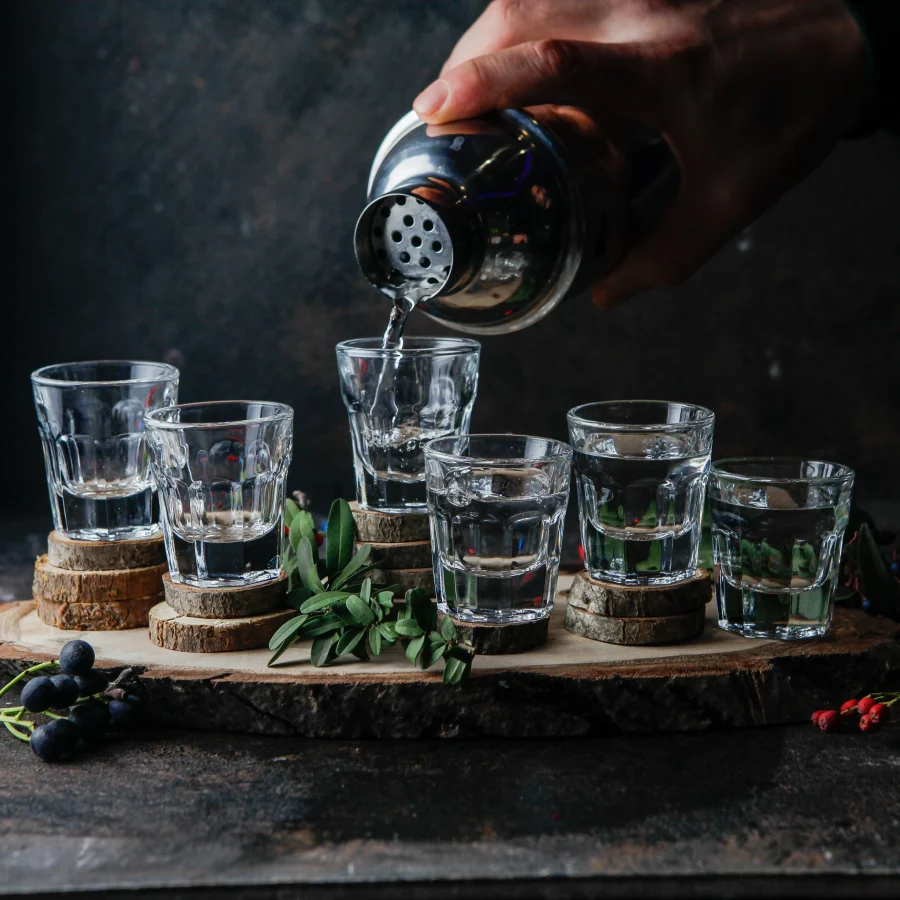Forget the marketing-driven notion that vodka should be tasteless, odorless, and indistinguishable. Today's artisanal British vodkas proudly display their provenance, production methods, and personality. From potato-based expressions that retain earthy depth to experimental grain blends that push the category's boundaries, UK craft distillers are proving that vodka can be every bit as complex and terroir-driven as its aged counterparts.
Beyond Neutrality: The New Philosophy
The traditional definition of vodka as a neutral spirit has long constrained the category. Industrial producers aimed for absolute purity—a goal that, while technically impressive, often resulted in products distinguished more by their packaging than their contents.
UK craft distillers have embraced a different philosophy: character over neutrality, distinctiveness over uniformity. As William Chase, founder of Chase Distillery, puts it: "Why would you want to strip away all the flavor when that's where the story of your ingredients lives?"
This approach draws inspiration from Eastern European traditions, where vodka has always been appreciated for its subtle flavor variations, while adding distinctly British agricultural sensibilities and experimental techniques.
The Base Materials: Starting with Substance
What truly sets craft vodka apart begins with the choice of base ingredients. While major commercial brands often use whatever fermentable is cheapest (typically commodity wheat or corn), small UK producers select their raw materials with the same care as a chef choosing produce.
Potato Perfection
Chase Distillery in Herefordshire pioneered the British potato vodka movement, using potatoes grown on their own farm. Their flagship vodka retains a distinctive creaminess and subtle earthy undertones that make it perfect for sipping neat, challenging the notion that vodka is merely a neutral mixer.
Black Cow in Dorset took an even more innovative approach with the world's first pure milk vodka. Using whey from cheese production, they create a uniquely smooth spirit with a subtle sweetness that has garnered international acclaim.
Grain Innovation
Grain-based vodkas dominate the market, but craft distillers bring innovation to this traditional approach. Scotland's Arbikie Distillery produces their Tattie Bogle vodka from a blend of wheat, barley, and potatoes grown on their single-estate farm, creating a spirit that marries the best qualities of both grain and potato bases.
The Oxford Artisan Distillery goes further by using heritage grains grown using medieval farming techniques. Their approach not only creates distinctive flavor profiles but also supports sustainable agriculture by restoring ancient grain varieties to commercial cultivation.
Beyond the Conventional
Some distillers push even further beyond convention. Ramsbury in Wiltshire creates vodka from their estate-grown horatio wheat and water from their own chalk-filtered aquifer, embodying the concept of "field-to-glass" production.
Devon's Countess Distillery produces Hops Vodka, distilled from locally-brewed beer, creating a uniquely aromatic spirit with subtle floral notes that beer enthusiasts particularly appreciate.
Production Methods: Craft in the Details
Beyond ingredients, production methods deeply influence vodka's character. While industrial producers focus on efficiency and consistency, craft distillers embrace methods that may be labor-intensive but yield more distinctive results.
Distillation Differences
Traditional column still distillation can produce extremely high-proof spirit with minimal congeners (flavor compounds), while pot still distillation typically retains more character at the expense of absolute purity. Many UK craft vodka makers use hybrid approaches or multiple distillations to find their perfect balance.
Southwold's Adnams Distillery distills their Longshore Vodka only three times, preserving subtle grain character, while Durham Distillery puts their vodka through a ten-plate copper column still for exceptional smoothness while maintaining distinctive mouthfeel.
Filtration Philosophy
Filtration represents perhaps the greatest philosophical divide in vodka production. Commercial brands often use aggressive filtration through charcoal and other media to remove all possible impurities and flavor compounds. Craft producers typically take a more restrained approach.
Penrhos Distillery in Herefordshire uses a minimal filtration method for their Apple Vodka, preserving the delicate fruit notes from their farm's cider apples. Similarly, Cooper King Distillery in Yorkshire filters their vodka just enough to remove unwanted compounds while preserving the distinctive character of their locally-sourced grain.
Water Sources
Water constitutes approximately 60% of the bottled product, making its quality and mineral content crucial to the finished vodka. UK craft distilleries often highlight their unique water sources as key differentiators.
The Lakes Distillery in Cumbria uses water from the River Derwent that has been naturally filtered through ancient slate, adding a distinctive minerality to their vodka. Similarly, Orkney Distilling uses water from a source that has filtered through 3-billion-year-old rock formations, creating a remarkably pure base for their Kirkjuvagr Vodka.
Tasting the Difference: A New Appreciation
How does one properly appreciate these characterful craft vodkas? Unlike their commercial counterparts, which are typically served ice-cold specifically to numb the palate to any harsh notes, craft vodkas benefit from more thoughtful service.
Temperature Matters
Serve premium craft vodkas lightly chilled (around 0-4°C) rather than freezer-cold. This temperature range suppresses any harsh alcohol notes while allowing subtle flavors to emerge. Many distillers recommend trying their products at different temperatures to discover how the experience changes.
The Glassware Question
While traditional shot glasses remain popular, serious vodka appreciation benefits from proper glassware. A small tulip-shaped glass concentrates aromas while providing enough space to swirl the spirit, releasing its more delicate notes.
Tasting Notes
When tasting craft vodkas, pay attention to:
-
Texture and mouthfeel: Potato-based vodkas typically present a creamy, viscous texture, while grain-based versions often feel lighter and crisper.
-
Entry and development: Note how the flavors evolve from first sip through to the finish. Quality craft vodkas often present different character notes at different stages.
-
Finish: Rather than the harsh burn of industrial vodkas, craft expressions should offer a clean, warming finish that invites another sip.
Regional Character: Emerging British Vodka Styles
As the British craft vodka scene matures, regional styles are beginning to emerge, influenced by local agricultural traditions and distilling philosophies.
Eastern England
East Anglian producers like Adnams and Wild Knight often work with local grain farmers to produce vodkas with crisp, clean profiles and subtle bready notes, reflecting the region's status as Britain's breadbasket.
Scotland
Scottish craft vodka makers frequently leverage their whisky heritage, with brands like Arbikie and Blackford creating robust, characterful spirits that challenge the boundary between unaged whisky and traditional vodka.
The West Country
Producers in the southwest like Chase and Newton House often focus on potato-based vodkas or fruit-infused expressions, taking advantage of the region's diverse agriculture to create vodkas with distinctive texture and subtle sweetness.
Beyond Neutral: Flavored and Infused Craft Vodkas
While purists may prefer their vodka unadorned, flavored expressions represent a significant portion of the craft market. Unlike commercial flavored vodkas that often rely on artificial additives, craft producers typically use natural infusion methods with real ingredients.
Exceptional examples include:
-
Fatty's Organic Vodka (Dulwich), which produces a remarkable citrus vodka using only organic unwaxed lemons infused into their wheat-based spirit.
-
Linden Leaf Organic Spirits (Cambridge), whose "88" vodka is vapor-infused with 88 different organic botanicals, creating a complex yet balanced flavor profile.
-
Brindle Distillery's Cuckoo Vodka (Lancashire), which offers a Spiced Honey variant made with locally sourced honey and subtle spices that complement rather than overwhelm the base spirit.
The Future of British Craft Vodka
The UK craft vodka movement continues to evolve, with several exciting developments on the horizon:
Sustainability initiatives are becoming central to many distilleries' identities, with producers like Arbikie pioneering climate-positive spirits and Cooper King developing carbon-negative production methods.
Aging experiments challenge vodka's traditional unaged nature, with producers like Lakes Distillery experimenting with brief resting periods in various wood types to add subtle complexity.
Collaborative cross-category innovation sees vodka producers working with brewers, winemakers, and even coffee roasters to develop unique expressions that defy easy categorization.
As consumer appreciation for these distinctive spirits grows, British craft vodka seems poised to shed its "supporting character" status and take its place alongside gin and whisky as a showcase for British agricultural excellence and distilling innovation.
The next time you reach for a vodka, consider setting aside preconceptions about neutrality and exploring the characterful world of British craft vodka—you may discover that this supposedly "flavorless" spirit has more to say than you ever imagined.

